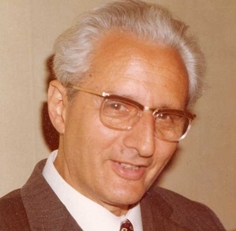György Striker
After graduating from university, he lived in the United States from 1938 to 1948, where he had difficulty finding a job at first (he started by repairing and servicing electronic instruments). Later he worked in various research institutes. Among other things, he participated in the development of the measuring sensors for the polygraph, the so-called lie detector, and in the creation of the first portable medium- and short-wave world-receiver radios.
In 1948, the management of the Orion Radio Factory called him home as a manager, and he soon became the factory's chief engineer. It was here that he began his career as a domestic instrument developer.
In 1950, he initiated the establishment of the Electronic Measuring Devices Factory (EMG) in Sashalm, of which he also became chief engineer.
Between 1954 and 1958, he was the director of the Institute of Measurement and Engineering (MÉMI), founded by the Hungarian Academy of Sciences. In 1955, a research group dealing with electronic calculators was established at the Institute, led by Rezső Tarján; from this group, the Hungarian Academy of Sciences Cybernetics Research Group (KKCS) was established in 1956.
In 1958, the Hungarian Academy of Sciences established the Research Laboratory of the Measuring Technology Center (MKKL), of which he was the director until its closure in 1973. The institution's task was to utilize the latest achievements of science and technology in the field of industrial measuring technology; in addition to research, the developed products were also manufactured.
He taught for 15 years at the Faculty of Electrical Engineering of the Budapest University of Technology (BME), at the Department of Instrumentation and Precision Mechanics, later renamed the Department of Instrumentation and Measurement Technology; he is an honorary university professor.
In 1958, he was one of the founders and secretary general of the International Federation of Metrology (IMEKO; Internationale Meßtechnische Konföderation), which awards a prize named after him to young scientists at its triennial congresses.
He played a decisive role in ensuring that Hungary could become a member of five major engineering world organizations during the Cold War period following World War II: IFAC (International Federation of Automatic Control), IMEKO, IFIP (International Federation for Information Processing), IFORS (International Federation of Operational Research Societies) and IMACS (Institute for Mathematics & Computer Science). These organizations had and still have an important role in the international relations of the NJSZT.
His well-known award is the Gold Degree of the Order of Merit for Labor (1964).
- Who founded EMG ("exclusive report", 1990.)
- A socialist large company founded by an entrepreneur (Management Forum, 2006.)
- Zoltán K. Szabó: The history of EMG
- Hungarian Academy of Sciences Institute of Measurement and Instrumentation (MÉMI)
- Hungarian Academy of Sciences Measurement Technology Center Research Laboratory (MKKL)
- award ceremony (1964)
- The creation of EMG – the role of György Striker
- He started working as a radio amateur at the age of thirteen or fourteen.
Created: 2021.01.02. 21:50
Last modified: 2024.05.18. 14:41

